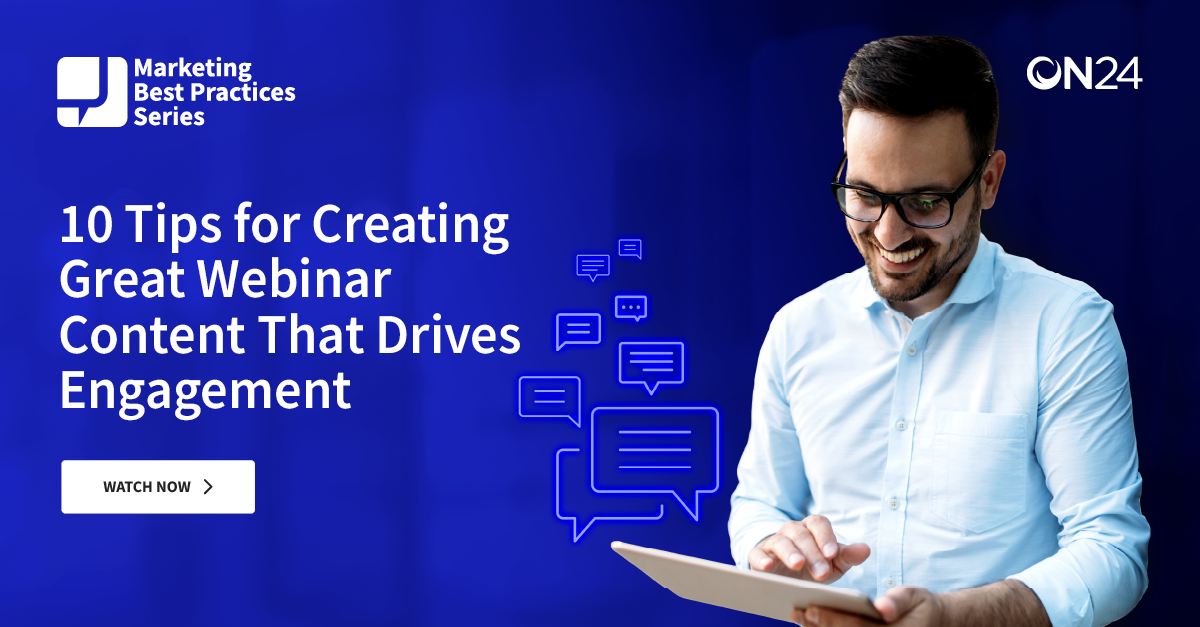Para captar y fidelizar clientes, los profesionales del marketing deben fomentar la participación. Y hoy en día, eso significa contar con una estrategia de marketing de interacción, un enfoque diseñado para crear y aprovechar oportunidades de interacciones significativas con un público objetivo.
Para ayudarle a mejorar la interacción digital, hemos elaborado esta guía en la que destacamos las estrategias de marketing de interacción más eficaces que pueden ayudarle a aumentar los ingresos y, al mismo tiempo, maximizar la fidelidad y la interacción de los clientes.
¿Qué es el marketing de compromiso?

El engagement marketing, o marketing de captación de clientes, es una estrategia de marketing diseñada para crear oportunidades de compromiso significativas con un público objetivo. Las empresas suelen utilizarlo para establecer relaciones más sólidas con sus clientes actuales y potenciales.
Las estrategias de engagement marketing se distinguen de otras estrategias principalmente por centrarse en la personalización. Su objetivo es ofrecer contenidos optimizados para un segmento de audiencia específico. segmento de audiencia en el momento adecuado y a través del canal adecuado para suscitar interacciones.
Estas interacciones se formulan para aportar un valor genuino a la audiencia: por ejemplo, indicándoles contenidos útiles o recordándoles una oferta por tiempo limitado. Con el tiempo, pueden transformar a los clientes en fieles a la marca.
Cómo iniciar una estrategia de marketing de captación de clientes

La creación de una estrategia de engagement marketing implica muchos de los mismos pasos que la creación de cualquier otro tipo de estrategia de marketing. A continuación se ofrece una visión general del proceso, analizando cada uno de los elementos clave.
Establecer objetivos claros para su campaña de marketing de captación
Como cualquier otra forma de marketing, las campañas de engagement marketing funcionan mejor cuando se construyen en torno a objetivos claramente definidos. De este modo se garantiza su alineación con los objetivos generales de la empresa y su contribución significativa a los indicadores clave de rendimiento (KPI). indicadores clave de rendimiento, o KPI.
Para decidir un objetivo, piense en cómo la participación del cliente puede contribuir a sus objetivos empresariales más amplios. Si el objetivo es aumentar los ingresos a largo plazo, por ejemplo, una campaña de marketing de captación podría diseñarse específicamente para aumentar la retención de clientes y, por extensión, el valor del ciclo de vida del cliente.
Identificar y comprender a su público objetivo
Las estrategias de marketing de captación se basan en una segmentación eficaz de la audiencia para garantizar la entrega de contenidos personalizados. En consecuencia, identificar un público objetivo bien definido y analizar sus necesidades, preferencias y comportamientos es un primer paso importante.
Lo mejor es utilizar un enfoque basado en datos, así que piense en cómo puede recabar información de su público. Esto podría implicar extraer datos existentes de su plataforma de gestión de relaciones con los clientes (CRM) o realizar una encuesta a los clientes para recopilar nuevos datos.
Creación de contenidos personalizados y pertinentes
Un contenido eficaz es la base del éxito de una campaña de marketing de captación de clientes, y el factor más importante de su eficacia es la resonancia que tenga en la audiencia. Hay dos componentes principales en el contenido resonante: la personalización y la relevancia.
Personalización garantiza que el contenido conecte con la audiencia, capte su atención y les haga sentirse valorados como clientes. Puede ser tan sencillo como personalizar los correos electrónicos con los nombres de los clientes o tan complicado como crear embudos de contenidos dinámicos que se adapten a los distintos segmentos de clientes.
La relevancia consiste en hacer llegar el mensaje adecuado al público adecuado en el momento adecuado y garantizar que sea realmente útil. Un buen ejemplo de contenido relevante es el envío de un correo electrónico con un tutorial detallado del producto a los nuevos usuarios inmediatamente después de que se registren.
Aprovechar las herramientas y plataformas de marketing de captación adecuadas
Dado que el engagement marketing se centra en la personalización, las herramientas y plataformas que ofrecen información a partir de los datos de los clientes y facilitan la entrega de experiencias de contenido personalizadas personalizadas a través de diversos canales.
Plataformas que recopilan datos datos de origen de campañas anteriores ofrecen la oportunidad de analizar el comportamiento de los clientes, lo que simplifica el proceso de creación de segmentos de clientes que puede utilizar para futuras campañas personalizadas.
Las herramientas de personalización de contenidos le permiten desplegar experiencias de contenidos personalizados a escala, a menudo utilizando funciones basadas en IA para automatizar en parte el proceso. Esto significa que puede llegar a diversos segmentos de su base de clientes con mensajes relevantes sin comprometer la calidad.
El sitio Plataforma de captación inteligente de ON24 contiene un conjunto de herramientas diseñadas para maximizar la eficacia de las campañas de marketing de captación. Recopila datos de todos los canales, proporciona información automatizada sobre el comportamiento de los clientes y agiliza la personalización de contenidos a gran escala.
Estrategias impactantes de marketing de compromiso

Las siguientes estrategias son especialmente adecuadas para impulsar el éxito de las campañas de marketing de compromiso. Facilitan la segmentación del público con los contenidos adecuados y maximizan el impacto de cada interacción.
Mejorar la experiencia del cliente con una comunicación personalizada
La personalización en la comunicación es la piedra angular del engagement marketing, y la identificación de oportunidades para lograrla debe ser el centro de prácticamente todos los elementos de una campaña centrada en el engagement, sea cual sea el canal que utilice.
En función de las características del producto que más utilicen, puede personalizar el contenido del correo electrónico para adaptarlo a las necesidades de un segmento de público concreto. En otros lugares, puede integrar chatbots en su sitio web para ofrecer interacciones personalizadas que dirijan a los usuarios hacia artículos relevantes.
Utilizar los datos para afinar las estrategias de participación
Conocer las necesidades de sus clientes le permite crear interacciones significativas con ellos a través del contenido. Por lo tanto, la recopilación y el análisis de datos deben ser una parte fundamental de su estrategia de marketing de captación de clientes.
Utilice todas las herramientas a su disposición, incluidos los datos de CRM, las herramientas de encuesta y los comentarios de los clientes, para hacerse una idea completa de su base de clientes. A continuación, defina segmentos de clientes en función de rasgos compartidos, como el tiempo que llevan inscritos o el sector en el que trabajan.
Estos segmentos pueden constituir la base de su estrategia de personalización. Trátelos como públicos distintos y diríjase a ellos con contenidos que se adapten a sus necesidades. No olvide actualizar sus segmentos con regularidad para garantizar su exactitud a largo plazo.
Fomentar las relaciones con los clientes mediante contenidos interactivos
El contenido interactivo es una herramienta poderosa en el marketing de interacción porque es naturalmente adecuado para provocar la interacción de la audiencia. Hay diversos tipos de contenidos interactivos que se pueden utilizar, entre ellos seminarios web interactivosencuestas o cuestionarios y demostraciones de productos
Estos tipos de contenido son excelentes para atraer a su audiencia, pero también tienen la ventaja añadida de proporcionar más datos que puede utilizar para perfeccionar aún más su estrategia de captación.
Atraer al público con contenidos de vídeo cautivadores
Los contenidos de vídeo también son idóneos para captar la atención y se asocian a índices de participación más elevados que la mayoría de las demás formas de contenido. Lo mejor de todo es que el contenido de vídeo es infinitamente adaptable, lo que significa que puede utilizarlo en toda su estrategia de marketing de captación para diversos fines.
Hay muchos formatos que explorar, desde vídeos explicativos hasta demostraciones de productos retransmitidas en directo. Cuando elabore una estrategia de contenidos de vídeo, piense en cómo puede reutilizar el contenido para adaptarlo a otros medios. Un seminario web completo, por ejemplo, se puede en vídeos más pequeños que son ideales para fomentar la participación en las redes sociales.
Fomentar la participación mediante el marketing de contenidos estratégico
Un enfoque estratégico del marketing de contenidos es esencial para dirigirse eficazmente al público con contenidos atractivos que se adapten a sus necesidades. Utilizar una guía de marketing de contenidos puede ayudarle a comprender cómo estructurar este enfoque de forma estratégica.
Construya su estrategia de marketing de contenidos en torno a los datos de los clientes para asegurarse de que dispone de todo el contenido que necesita para su campaña. Identificar los puntos débiles más comunes de los clientes y utilizarlos como base para el contenido es un buen punto de partida para maximizar las posibilidades de que el contenido sea relevante para las necesidades de los clientes.
Además, tenga en cuenta los formatos de contenido disponibles. Algunos temas se tratarán mejor en una entrada de blog, mientras que otros pueden tener más sentido en un vídeo o un libro blanco.
El impacto del marketing de compromiso en el crecimiento empresarial

El engagement marketing puede desempeñar un papel clave en una estrategia de marketing más amplia, pero para sacarle el máximo partido es necesario saber cómo medir los resultados y mantenerse a la vanguardia.
Analizar el ROI de las estrategias de marketing de captación
Medir el éxito de una estrategia de marketing de captación no es tan sencillo como en otros tipos de marketing, ya que las métricas del éxito no se limitan estrictamente a la generación inmediata de ingresos.
Dependiendo del objetivo que establezca para su campaña de marketing de interacción, puede considerar diversas métricas como la retención de clientes, el tiempo total de interacción, el crecimiento del perfil en las redes sociales o incluso el aumento de las reseñas de productos como indicadores de éxito.
Sea cual sea la medida del ROI de su campañaasegúrese de medirlo con precisión. Como todas las estrategias de marketing, el marketing de captación funciona mejor cuando los datos de rendimiento pueden utilizarse para ajustar el enfoque a lo largo del tiempo.
Ampliar el alcance con la participación de la comunidad
Crear y alimentar una comunidad en torno a su marca puede fomentar conexiones más profundas con su público. Aproveche las plataformas de medios sociales, los foros de debate o las comunidades en línea especializadas para crear espacios en los que los clientes puedan interactuar entre sí y con su marca. Organizar sesiones de preguntas y respuestas en directo o establecer grupos de usuarios centrados en sus productos puede proporcionar un foro para conversaciones valiosas, posicionando su marca como un eje central en su sector.
Aprovechar la prueba social para establecer conexiones más profundas
La prueba social es una de las herramientas más eficaces para aumentar la participación y generar confianza. Compartir historias de éxito de clientes, reseñas y testimonios crea autenticidad y muestra ejemplos reales de su producto o servicio en acción. Los contenidos generados por los usuarios, como las publicaciones en redes sociales en las que aparece su producto, pueden amplificarse para generar más confianza y compromiso, al tiempo que demuestran su conexión activa con su público.
Incorporar la gamificación para aumentar el compromiso
La gamificación transforma el compromiso en una experiencia gratificante. Incorpore a sus campañas funciones como tablas de clasificación, sistemas de puntos o insignias para motivar y entusiasmar a su público. Por ejemplo, crear retos o contenidos interactivos -como concursos con recompensa- anima a participar y fomenta la sensación de logro. La gamificación es especialmente eficaz para conseguir interacciones repetidas y fidelizar a los usuarios a largo plazo.
Alinear las campañas con los valores del cliente
El público se siente cada vez más atraído por las marcas que coinciden con sus valores personales. Desarrollar estrategias de compromiso en torno a la sostenibilidad, la diversidad o el impacto en la comunidad puede hacer que sus campañas tengan una mayor resonancia. Destacar el compromiso de su marca con estos valores a través de historias, asociaciones o iniciativas sociales conecta con su audiencia a un nivel más significativo.
Captar la atención mediante campañas omnicanal
Una experiencia fluida a través de múltiples canales garantiza que se encuentra con su público dondequiera que esté. Un enfoque omnicanal podría incluir la combinación de campañas de correo electrónico con puntos de contacto en las redes sociales o la integración de seminarios web en sus iniciativas de publicidad directa. Por ejemplo, compartir invitaciones personalizadas a seminarios web a través de LinkedIn mientras promociona el mismo evento a través de su lista de correo electrónico maximiza la exposición y la participación.
Tendencias futuras: La evolución del marketing de compromiso
Las tendencias tendencias de engagement marketing en 2024 están relacionadas con las nuevas formas de afrontar el reto de crear campañas que funcionen bien a escala. La IA está en el centro de la conversación, ya que es probable que desempeñe un papel cada vez más importante en la personalización de contenidos a gran escala.
Adopción de una plataforma de engagement marketing con funciones de IA es una de las mejores formas de adelantarse a la tendencia y garantizar la creación eficiente de campañas. Las herramientas de IA ya pueden ayudar a analizar los datos de los clientes, crear embudos de contenidos personalizados y atender de forma autónoma a los clientes a través de chatbots.
Tecnología y herramientas útiles para apoyar el engagement marketing

La ejecución eficaz de las estrategias de marketing de captación requiere un sólido conjunto de herramientas diseñadas para mejorar la personalización, agilizar los flujos de trabajo y proporcionar información procesable. Con plataformas como ON24, puede transformar la forma en que su organización interactúa con el público y mide el éxito.
ON24: compromiso personalizado a gran escala
La plataforma ON24 permite a los profesionales del marketing crear experiencias dinámicas y personalizadas que resuenan entre el público. Ya se trate de organizar seminarios web interactivos, crear centros de compromiso o celebrar eventos virtuales personalizados eventos virtualesON24 garantiza que cada punto de contacto sea significativo e impactante. Funciones como las encuestas, las preguntas y respuestas y las descargas de recursos permiten a los responsables de marketing captar información en tiempo real al tiempo que aportan valor a los asistentes.
Gestión centralizada de datos con ON24 Intelligence
Las funciones de análisis e informes de ON24 ofrecen una visión completa de la participación en todos sus contenidos y eventos. La suite ON24 Intelligence le permite medir el comportamiento de la audiencia, realizar un seguimiento del rendimiento de los contenidos e identificar clientes potenciales de alto valor. Esta información permite a los equipos de marketing y ventas colaborar sin problemas y optimizar las estrategias para obtener el máximo rendimiento de la inversión.
Herramientas interactivas de creación de contenidos
El compromiso se nutre de la interactividad. ON24 ofrece herramientas que le permiten incorporar a sus campañas elementos como cuestionarios, encuestas y sondeos en directo. Estas características no sólo impulsan la participación, sino que también generan datos valiosos para perfeccionar su enfoque. Los seminarios web interactivos y los contenidos a la carta garantizan la participación de su público, independientemente de dónde se encuentre.
Integración perfecta con su pila tecnológica
La plataforma plataforma ON24 se integra sin esfuerzo con los principales CRM, sistemas de automatización de marketing y otras herramientas empresariales, creando un sistema unificado para gestionar y optimizar el compromiso. Esta integración perfecta garantiza que sus equipos tengan acceso a datos y perspectivas en tiempo real, eliminando silos y mejorando la colaboración.
Aprovechar las estrategias de marketing de compromiso

El éxito de una campaña de engagement marketing puede repercutir drásticamente en el rendimiento general de la empresa, aumentando la fidelidad de los clientes existentes y atrayendo a otros nuevos. Sin embargo, se basa en un planteamiento estratégico orientado en torno a un objetivo claro e impulsado por los datos.
Aproveche al máximo los datos de que dispone, utilice distintos tipos de contenido en función de sus necesidades, sitúe la personalización en el centro de su enfoque y supervise el rendimiento para poder introducir mejoras.
Para sacar el máximo partido a su estrategia de marketing de captación, utilice una solución específica de captación de clientes como la Plataforma de captación inteligente de ON24 para obtener las ventajas de los análisis avanzados, la automatización impulsada por IA y mucho más.




